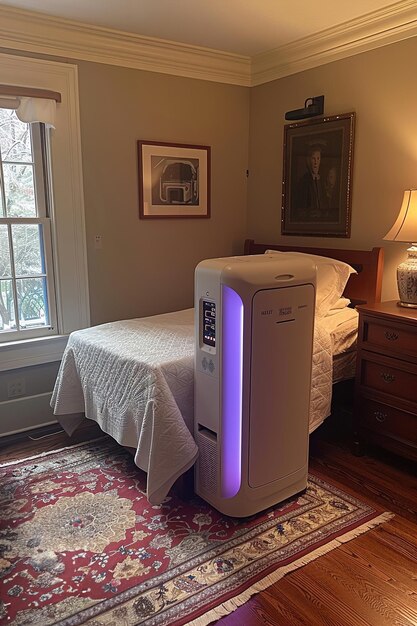Managing Seasonal Allergies: Relief Solutions for US

Effective management of seasonal allergies involves a multi-faceted approach, combining proactive measures, environmental controls, and a range of treatment options from over-the-counter remedies to prescription medications and natural therapies, offering significant relief during peak pollen seasons for individuals in the US.
As seasons shift, many Americans brace themselves for the inevitable onset of seasonal allergies. Far from a mere inconvenience, these allergies can profoundly impact daily life, productivity, and overall well-being. Understanding why they occur and how to effectively combat them is crucial for millions. This comprehensive guide delves into Managing Seasonal Allergies: Practical Solutions for Relief in the Coming Months, offering actionable strategies to navigate the challenging seasons with greater comfort and control.
Understanding seasonal allergies: the root causes
Seasonal allergies, often referred to as hay fever or allergic rhinitis, are an immune system overreaction to airborne substances typically harmless to most people. These substances, known as allergens, are usually present during specific times of the year, hence the term “seasonal.” The immune system mistakenly identifies these allergens as threats, releasing chemicals like histamine that lead to characteristic allergy symptoms.
The primary culprits behind seasonal allergies are pollens, which vary significantly by season and geographic location. In spring, tree pollen is a major trigger, with oaks, birches, and maples being common offenders across the United States. As summer approaches, grass pollen takes center stage, and by late summer and fall, weed pollens, particularly ragweed, become the predominant allergen.
The role of genetics and environment
While environmental exposure plays a direct role, genetics can predispose individuals to develop allergies. If one or both parents have allergies, their children are more likely to develop them, sometimes to different allergens. Environmental factors like air pollution and climate change can also exacerbate allergy symptoms. Rising global temperatures contribute to longer pollen seasons and higher pollen counts, making allergy management an increasingly complex challenge.
- Tree pollen: Dominant in spring (March to May), affecting upper respiratory symptoms.
- Grass pollen: Peaks in late spring and early summer (May to July), common across fields and lawns.
- Weed pollen: Prevalent in late summer and fall (August to October), with ragweed being a significant trigger.
- Mold spores: Can be year-round but increase in damp, warm conditions, both indoors and outdoors.
Understanding these fundamental causes and triggers is the first step toward effective management. By identifying which allergens affect an individual, targeted strategies can be developed, moving beyond merely treating symptoms to proactively mitigating exposure.
For many, seasonal allergies are a recurring battle, marked by sneezing, itchy eyes, and nasal congestion. Recognizing the specific type of pollen or allergen causing the reaction is key to developing an effective management plan. This knowledge empowers individuals to track pollen counts and avoid peak exposure times, laying the groundwork for better symptom control.
Proactive measures and environmental controls
Effective management of seasonal allergies extends beyond medication. Proactive measures, particularly environmental controls, can significantly reduce exposure to allergens and mitigate symptoms. These strategies focus on minimizing direct contact with airborne irritants, both indoors and outdoors.
One of the most effective proactive steps is staying informed about local pollen counts. Many weather apps and health websites provide daily pollen forecasts. On days with high pollen, it’s advisable to limit outdoor activities, especially during peak pollen release times, which typically occur in the morning. If spending time outdoors is unavoidable, wearing a wide-brimmed hat and sunglasses can help prevent pollen from settling on hair and around the eyes.
Creating an allergen-free indoor sanctuary
Your home should be a haven from outdoor allergens. Keeping windows and doors closed, especially during high pollen seasons, is a simple yet effective barrier. Air conditioning, particularly units with HEPA (High-Efficiency Particulate Air) filters, can trap pollen and other airborne particles, improving indoor air quality. Regular cleaning is also critical.
- Use HEPA filters: Install HEPA filters in your HVAC system and consider a portable HEPA air purifier for bedrooms.
- Regular vacuuming: Vacuum at least twice a week using a vacuum cleaner equipped with a HEPA filter.
- Wash bedding frequently: Wash sheets, pillowcases, and blankets in hot water (at least 130°F or 54°C) weekly to remove dust mites and pollen.
- Shower after outdoor activities: Rinse off pollen from your skin and hair to prevent it from spreading indoors.
Even pets can carry pollen indoors. If your pet has been outside, wipe down their fur with a damp cloth before they come back inside. Avoiding line-drying laundry outdoors during high pollen season is another small change that can make a big difference, as pollen can easily cling to clothes. These seemingly minor adjustments collectively contribute to a substantial reduction in allergen exposure, making the indoor environment more comfortable and less symptomatic.

By consciously incorporating these environmental controls into daily routines, individuals can create a less allergenic living space, providing significant relief from persistent seasonal symptoms. These practices work in tandem with medical treatments, forming a holistic approach to allergy management.
Over-the-counter remedies: a first line of defense
For many individuals experiencing seasonal allergies, over-the-counter (OTC) medications serve as the first and often sufficient line of defense. These readily available remedies target various symptoms, offering quick and accessible relief without the need for a prescription. Understanding the different types and their primary actions is key to choosing the most appropriate option.
Antihistamines are perhaps the most common OTC allergy medications. They work by blocking histamine, the chemical released by the immune system during an allergic reaction that causes symptoms like sneezing, itching, and runny nose. Newer generation antihistamines, such as loratadine (Claritin), fexofenadine (Allegra), and cetirizine (Zyrtec), are non-drowsy and can be taken daily for sustained relief. Older generation antihistamines, like diphenhydramine (Benadryl), can cause drowsiness and are generally preferred for nighttime use or when sedative effects are acceptable.
Nasal sprays and decongestants
Nasal sprays come in several forms, each targeting different aspects of allergy symptoms. Corticosteroid nasal sprays (e.g., fluticasone, budesonide) are highly effective in reducing inflammation in the nasal passages, thereby alleviating congestion, sneezing, and runny nose. They often take a few days to reach full efficacy, so consistent daily use before allergy season begins or at the first sign of symptoms is recommended.
- Nasal corticosteroids: Reduce inflammation and wide range of allergy symptoms.
- Antihistamine nasal sprays: Provide quick relief for sneezing and itching.
- Decongestant nasal sprays: Offer temporary relief for nasal congestion but should not be used for more than a few days to avoid rebound congestion.
- Saline nasal sprays: Help flush out allergens and moisturize nasal passages, safe for daily use.
Oral decongestants, such as pseudoephedrine (Sudafed) and phenylephrine, help relieve nasal and sinus congestion by narrowing blood vessels in the nasal passages. However, they can cause side effects like increased heart rate, blood pressure elevation, and insomnia, and should be used with caution, particularly by individuals with certain medical conditions. Eye drops, both antihistamine and decongestant formulations, can also provide relief for itchy, watery, and red eyes.
When selecting OTC remedies, it’s wise to consider specific symptoms, potential side effects, and duration of action. Consulting with a pharmacist can also provide valuable guidance on appropriate usage and potential interactions with other medications. These accessible solutions empower many to manage their seasonal allergy symptoms effectively without needing to visit a doctor.
Prescription medications and advanced treatments
When over-the-counter options prove insufficient, healthcare providers may recommend prescription medications or more advanced treatments for managing seasonal allergies. These interventions offer stronger relief and target specific mechanisms of the allergic response, providing a crucial next step for individuals with severe or persistent symptoms.
For those who don’t find adequate relief from OTC nasal corticosteroids, prescription-strength versions may be prescribed. These are often more potent and can offer greater symptom control. Additionally, prescription antihistamines, while similar in mechanism to their OTC counterparts, might be available in different formulations or dosages, or be more effective for certain individuals.
Immunotherapy: addressing the root cause
Allergen immunotherapy, commonly known as allergy shots, is a long-term treatment option that can provide lasting relief by gradually desensitizing the immune system to specific allergens. This involves administering increasing doses of the allergen over time, typically through injections given regularly over several years. The goal is to build tolerance and reduce the severity of allergic reactions.
- Subcutaneous immunotherapy (SCIT): The traditional allergy shot method, administered in a doctor’s office.
- Sublingual immunotherapy (SLIT): Involves taking allergen extracts under the tongue, available as tablets or drops, often administered at home.
- Benefits of immunotherapy: Can reduce reliance on daily medication, prevent the development of new allergies, and potentially prevent asthma in some children.
While immunotherapy requires a significant time commitment, its potential to alter the natural course of allergic disease makes it a valuable option for many. It is particularly considered for individuals who experience severe symptoms, have multiple allergies, or whose quality of life is significantly impacted despite conventional medication.

Beyond immunotherapy, other prescription options include leukotriene modifiers (e.g., montelukast), which block chemicals involved in allergic inflammation, and in rare, severe cases, certain biologic drugs. These advanced treatments are typically reserved for individuals with severe, refractory allergies and are administered under strict medical supervision. Consulting with an allergist or immunologist is essential to determine if these advanced treatments are appropriate, ensuring a tailored and effective management plan.
Lifestyle adjustments and complementary therapies
Beyond medical interventions, incorporating certain lifestyle adjustments and exploring complementary therapies can significantly enhance the management of seasonal allergies. These approaches often focus on strengthening the body’s natural defenses, reducing overall inflammation, and minimizing allergen exposure through holistic means.
Diet can play a role in managing allergic responses. While specific dietary recommendations for allergies vary and are often individualized, some people find relief by reducing intake of inflammatory foods and increasing consumption of anti-inflammatory foods. Foods rich in omega-3 fatty acids, like fatty fish, and those abundant in antioxidants, such as colorful fruits and vegetables, may help modulate the immune response.
Natural remedies and supplements
Many individuals turn to natural remedies and supplements for allergy relief. While scientific evidence varies for these approaches, some have shown promise for certain individuals. Quercetin, a flavonoid found in plants, is often studied for its antihistamine properties, while stinging nettle is sometimes used to reduce allergy symptoms.
- Nasal irrigation (Neti Pot): Flushes out allergens and mucus from nasal passages using a saline solution.
- Bromelain: An enzyme found in pineapple, sometimes used for its anti-inflammatory effects.
- Butterbur: A herb that has shown some effectiveness in reducing allergy symptoms in studies, though concerns exist regarding potential liver toxicity.
- Acupuncture: Some studies suggest it may help reduce symptoms for certain allergy sufferers.
It’s crucial to approach natural remedies with caution and consult a healthcare provider before incorporating supplements, especially if pregnant, breastfeeding, or taking other medications. The quality and purity of supplements can vary widely, and some may interact negatively with prescription drugs or have their own side effects.
Stress management techniques, such as yoga, meditation, and deep breathing exercises, can also be beneficial indirectly. While not directly treating allergies, stress can exacerbate immune responses and inflammation, so reducing stress may help the body cope better with allergens. Prioritizing adequate sleep also supports overall immune function, which can be beneficial for managing allergy symptoms.
Adopting a holistic view that integrates consistent self-care, mindful environmental choices, and potentially supportive natural therapies alongside conventional treatments can lead to more comprehensive and effective management of seasonal allergies.
When to see a doctor: identifying red flags
While many individuals can manage their seasonal allergies with over-the-counter medications and lifestyle adjustments, there are specific situations where seeking professional medical advice becomes necessary. Recognizing these “red flags” ensures timely intervention, potentially preventing more severe health issues and optimizing treatment strategies.
One primary reason to consult a doctor is if your symptoms are severe, persistent, or significantly impacting your daily life despite using OTC remedies. This includes chronic nasal congestion that interferes with sleep, frequent sinus infections, or severe eye irritation that affects vision or comfort. Uncontrolled allergy symptoms can lead to fatigue, decreased concentration, and a reduced quality of life, warranting a medical evaluation.
Distinguishing allergies from other conditions
It’s also important to see a doctor if you are unsure whether your symptoms are indeed allergies. Conditions like the common cold, sinus infections, or even non-allergic rhinitis can present with similar symptoms. A healthcare professional can accurately diagnose the cause of your symptoms through a thorough medical history, physical examination, and potentially allergy testing.
- Symptoms worsening or not improving: If your usual remedies aren’t working, or symptoms are intensifying.
- Recurrent infections: Frequent sinus infections, ear infections, or bronchitis may indicate uncontrolled allergies.
- Asthma symptoms: If you experience wheezing, shortness of breath, or chest tightness, especially during allergy season, seek immediate medical attention.
- Side effects from medication: If you experience adverse reactions to allergy medications, consult your doctor.
If you suspect you have asthma, or if existing asthma symptoms worsen during allergy season, it’s crucial to see a doctor promptly. Allergies can trigger or exacerbate asthma, and proper management of both conditions is vital. Additionally, if you are experiencing severe allergic reactions (anaphylaxis), such as difficulty breathing, swelling of the face or throat, or a sudden drop in blood pressure, seek emergency medical care immediately.
An allergist or immunologist, a specialist in allergies and immune system disorders, can provide comprehensive diagnostic testing, including skin prick tests or blood tests, to identify specific allergens. They can then recommend personalized treatment plans, which may include prescription medications, immunotherapy, or specialized advice on allergen avoidance. Regular follow-up with a healthcare provider ensures that your allergy management plan remains effective and adapts to your changing needs.
| Key Point | Brief Description |
|---|---|
| 🤧 Understand Triggers | Identify specific pollens (tree, grass, weed) or molds to tailor your management strategy. |
| 🏡 Control Environment | Keep windows closed, use HEPA filters, and clean regularly to reduce indoor allergens. |
| 💊 OTC/Prescription Meds | Utilize antihistamines, nasal sprays, and decongestants. Consult a doctor for stronger options. |
| 💉 Advanced Treatments | Consider immunotherapy (allergy shots/SLIT) for long-term desensitization under medical guidance. |
Frequently asked questions about seasonal allergies
The most common symptoms include sneezing, runny or stuffy nose, itchy or watery eyes, and an itchy throat or ears. Some individuals may also experience cough, post-nasal drip, and fatigue due to disrupted sleep. Symptoms often manifest when specific pollens or molds are prevalent in the environment.
Yes, seasonal allergies can develop at any age, even if you’ve never had them before. The immune system can become sensitized to allergens over time due to repeated exposure, leading to the onset of symptoms. Genetic predisposition, changes in environment, and prolonged exposure can all contribute to adult-onset allergies.
Allergies typically involve itchy eyes, nose, and throat, and can last for weeks or months, often recurring seasonally. Colds, on the other basis, rarely cause itchiness and usually resolve within 7-10 days. Colds might also present with fever or body aches, which are not typical allergy symptoms. Clear, watery nasal discharge is common in allergies.
Some natural remedies include nasal irrigation with saline solutions, consuming local honey (though scientific evidence is weak), using supplements like quercetin or stinging nettle, and practicing anti-inflammatory diets. Always consult a healthcare professional before trying natural remedies, especially if you have other health conditions or take medications.
Ideally, it’s best to start allergy medication, particularly nasal corticosteroids, about 1-2 weeks before your typical allergy season begins. This allows the medication to build up in your system and become fully effective before pollen counts peak. For sudden symptom onset, antihistamines can provide faster relief.
Conclusion
Effectively managing seasonal allergies is a multi-faceted endeavor that combines proactive measures, environmental controls, and a range of treatment options. From understanding your specific triggers and adapting your living environment to utilizing over-the-counter remedies, prescription medications, and advanced immunotherapies, a tailored approach is key to achieving relief. By staying informed, consulting healthcare professionals when needed, and consistently applying practical solutions, individuals can significantly reduce the impact of seasonal allergies, allowing them to enjoy the changing seasons with greater comfort and well-being.





